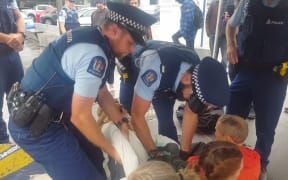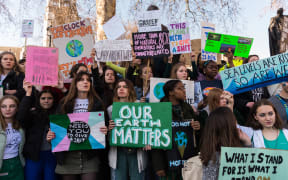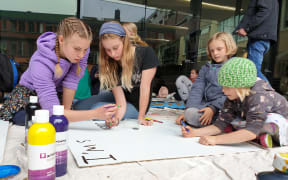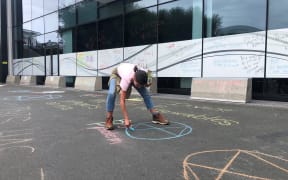By Alex Braae for The Spinoff.
Take urgent action on climate change or face mass, worldwide death - that's the stark message of a new global protest movement that calls itself Extinction Rebellion, who have recently become active in New Zealand. Alex Braae reports on a demonstration the Auckland chapter undertook, and the increasing alarm being caused by climate inaction.
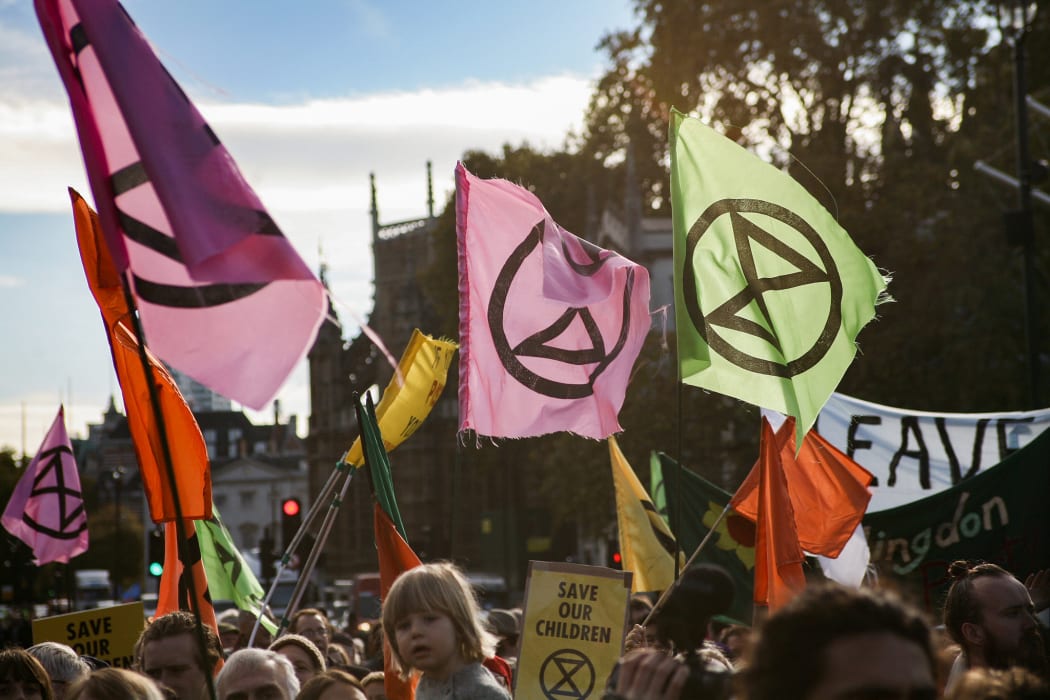
Photo: Extinction Rebellion
What would you do if someone told you the world was going to end, and they knew exactly how it would happen? They have graphs and studies, trajectory lines sweeping up to terrifying new heights, projections that can only possibly mean doom. The evidence is overwhelming and irrefutable, and yet all around you life goes on as normal. How does anyone deal with that?
Many people are more than capable of compartmentalising these things, and getting up for work in the morning. Some are utterly disbelieving, insisting that it simply cannot be happening. Some go numb. Others look at the concerning information, and agree that someone should probably do something about it, but perhaps in a few years.
Awareness of climate change is greater than it has ever been in human history, higher even than when Al Gore released An Inconvenient Truth more than a decade ago. Positions that would have once been considered totally alarmist - societal collapse, the Earth becoming literally uninhabitable - are increasingly uncontroversial in a scientific sense. But globally, the greenhouse gas emissions that cause climate change are still rising, to the point that a new annual emissions record was set in 2018. In response, all over the world a movement is springing up, hoping to radically alter the trajectory humanity is on. Fittingly for the apocalyptic premise on which they're based, they call themselves Extinction Rebellion.
Extinction Rebellion strikes
The police arrived before the protesters.
Outside Newmarket train station in the sunshine stood two cops. I asked them if there were more waiting at the march's destination. "Oh no," said one. "It's just us."
Extinction Rebellion protesters were about to undertake their biggest direct action event in Auckland to date. The plan was to head to the local BP head office, send people into the lobby, politely ask to deliver a letter in person to the CEO, and refuse to leave until they were able to do so. I wondered if perhaps BP had been picked out for their egregious history of blocking climate action, but no, it was just that they had a head office right there in Newmarket, and so were a realistic target for this particular group to get to.
The atmosphere as numbers built up was relaxed, without the crackle around protest groups when they know they're heading into a fight. While the messages of their placards screamed of death and destruction being inflicted on the planet, the people themselves looked more like the family and friends of a beloved Nana coming around for her 70th birthday. Apart from skewing older and more female, the only demographic group that was significantly represented was men wearing sandals.
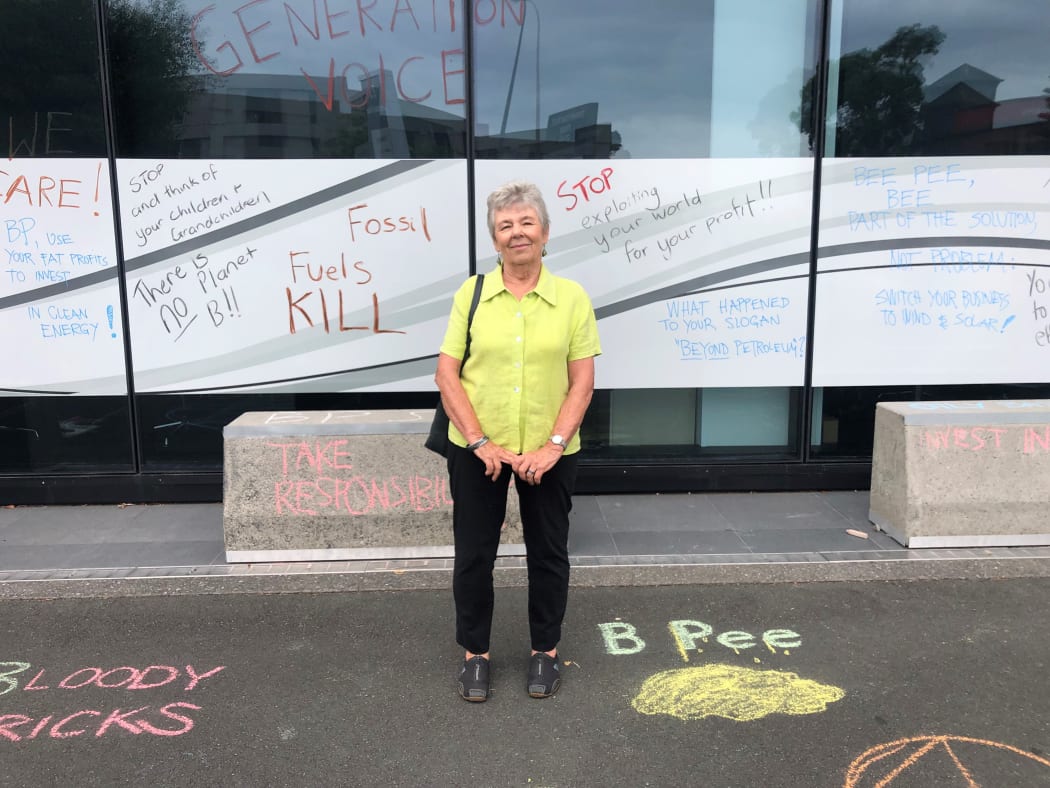
Extinction Rebellion spokesperson Lynne Dempsey at the BP's office, where a group of protesters made their voices heard earlier in March. Photo: RNZ / Brooke Jenner
The press spokesperson for the day, Lynne Dempsey, was remarkably spry for a great-grandmother. She was one of a group of older women who had declared themselves prepared to be arrested, a last line of refusal against being forced to leave the building once they were inside. With many of the younger members holding cameras, the message to police and any security on the scene was clear - manhandle these people in the name of protecting polluters if you dare. It was one of the many examples I had seen in recent weeks of climate protesters understanding that protests can create a certain kind of narrative power. At a planning meeting for this week's school strikes, a year 13 student called Luke pointed me out in the corner, saying, "imagine how much the media would love it if a school tried to expel one of us".
But even before setting off to the BP office, it was clear that relationships with police would be friendly. While Extinction Rebellion have a policy of keeping the details of their direct action events under wraps as long as possible, they have also established strong lines of communication with police. Perhaps it's because many of them are self-described "nice, middle-class women" that they don't, on the whole, see the police as an enemy. Rather, they see the police as a tool to be used tactically. Many are willing to be arrested, if that is in the interests of the protest.
To get hyped up for the action, the protesters stood around in a circle and very calmly and earnestly shared facts with each other. The discussion went on for quite some time, covering the 1.5 degrees of warming that is almost certainly now unavoidable, the catastrophic effects that further warming will have, and the lack of commitment being shown by governments and businesses to doing anything about it. There was a lot of agreeable nodding. A chant for later was whipped up: "Invest in renewables." Chalk sticks and pens were handed out so that people could start writing on the footpaths and walls around BP as soon as they arrived.
"Can I just say," broke in one woman right when the group was about to set off, "I'm delighted to see us all here. I thought it might just be a few of us, but this is grand," she exclaimed, sweeping an arm around the crowd of 50 or so. A cheer went up, and a man in a blue-collared business shirt, sensible slacks and boat shoes piped up with a final piece of advice. "If the police ask you why you're writing on the footpath, just say I don't know what you're chalking about." The dad joke earned an appreciative groan - it was pitched at people who had heard and told plenty before.
'No hierarchy, no leadership, and no money'
Extinction Rebellion are really more of an idea than a group in the traditional sense.
Or perhaps it would be more accurate to describe them as a broad, decentralised network of groups. The first of them started forming in Britain last year in the wake of the dramatic IPCC report. The headline that many took from that was that humanity had 12 years to radically reshape the world economy away from fossil fuels if warming was going to be kept to 1.5 celsius above pre-industrial levels - though the report stressed the best time to act was now. People involved with Extinction Rebellion consider 12 years to be on the conservative end of what should be aimed for.
There are three main platforms that drive all of the Extinction Rebellion groups that have sprung up around the world. The first is that governments have to tell the truth about the scale of the crisis - they believe that projections and targets that are currently being set on emissions don't go remotely far enough. Their second goal is more concrete - that greenhouse gas emissions must be brought down to net zero by 2025. Currently, the Zero Carbon bill, which is making glacial progress through the New Zealand parliament, aims to reduce emissions to net zero by 2050.
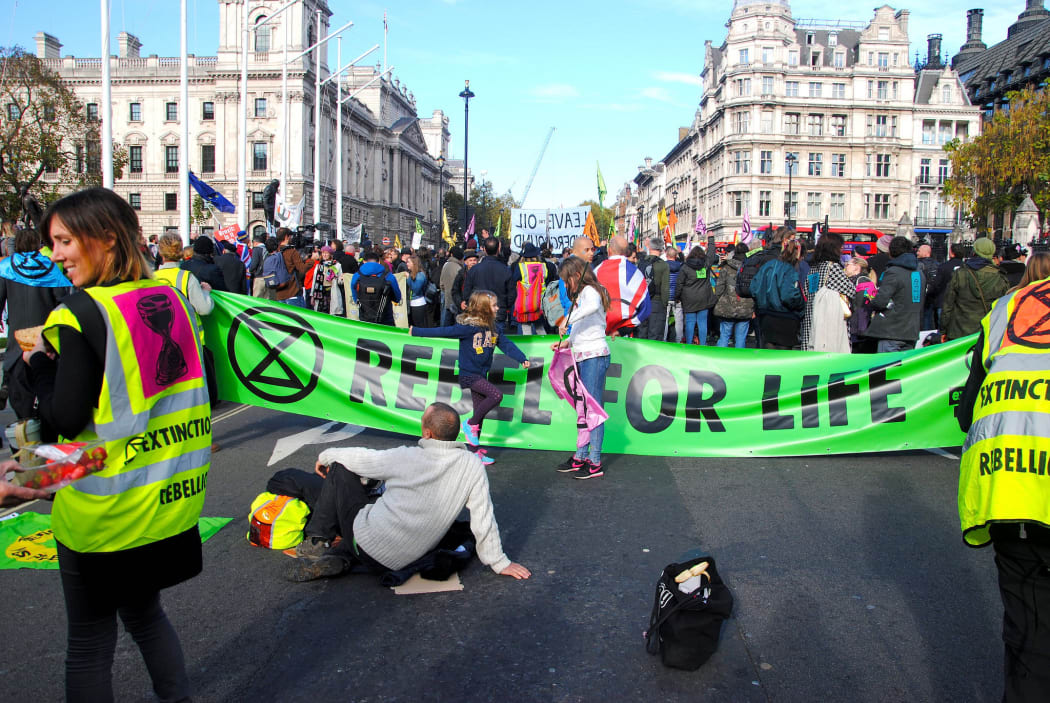
Photo: Extinction Rebellion
Their distinctive symbol has started popping up all over social media. It's an X, shaped to look like an hourglass, inside a circle. The meaning isn't subtle. Groups have been growing rapidly around the world, and now include more than a dozen around New Zealand. The crowd at a meeting in central Auckland leaned much younger than that which turned out for the BP protest, and the group itself was simply much bigger. The organiser of a meeting at Strange Haven on Karangahape Road put out 40 chairs or so, expecting one or two empty seats. By the time the meeting was under way, there wasn't a spare patch of wall to stand against. Not only are the number of groups growing rapidly around the country and the world, it almost seemed like this group was literally growing over the space of one meeting to the next.
The third goal is more amorphous and could potentially be a huge political sticking point - "a national Citizen's Assembly to oversee the changes, as part of creating a democracy fit for purpose." As with any new group that grows rapidly, tensions are currently playing out over tactics, direction and ideology. At the Strange Haven meeting, a ponytailed man briefly derailed the discussion by questioning whether they should be looking to work within the system, or outside it entirely. "The system doesn't have any interest in changing itself," he implored, needling the group towards the topic of the nature of government, rather than what everyone had gathered to talk about. Outside Auckland, anti-1080 activists are said to have attempted to redirect discussion to their cause. One meeting facilitator described the organisation as being one with "no hierarchy, no leadership, and no money". New Zealand organisers are working on wording to include the role of Te Tiriti in their objectives.
There also appears to be a bit of a disconnect between (relative) moderates in the group, and firebrands. Many of the older members hark back to earlier protests - the Springbok Tour, the nuclear-free movement - they were part of with a sense that the moral weight of their arguments displayed at protests will carry the day. Others want to be much more direct about their action. One man with nervous eyes at the meeting told me in furtive tones that he'd much rather be out trying to blockade the gates of the Marsden Point oil refinery, or some other method of literally stopping production, than the sorts of protests currently planned. But at this stage of the group's existence, they are all by and large on the same page.
The BP action was one of several early salvos for New Zealand groups. Extinction Rebellion members earlier disrupted traffic in Tauranga, and managed to cut the water to Environment Canterbury's offices in Christchurch. There are plans for a protest at Auckland Council, calling on them to declare a climate emergency. In keeping with the hardcore rhetoric favoured by the group, that protest will include a mock funeral - other protests in Britain have had names like 'Blood of Our Children'. Extinction Rebellion members in Auckland are also providing advice and operational support for this week's student strikes.
XR's big day of global action falls exactly a month after the climate strike, on April 15. The group keeps details under wraps until the last moment: at an earlier planning meeting for the BP demonstration, I was asked to leave for a large chunk of it, and the majority of people I spoke to for this story asked for their names to not be used. What they have revealed though is that they plan to disrupt as many cities and towns around the world as they can on a single day, with a view that politicians simply won't be able to ignore them if they achieve that. It is also understood that the day will mark the start of a hunger strike in a prominent New Zealand location.
There was no one waiting at BP to keep protesters outside the front door.
A small group went into the lobby as the advance guard while the rest set up their microphone and banners out the front. They encountered a hurdle immediately: the door to BP's offices had been locked. No matter, said the protesters, and set about trying to attach themselves to BP's door with a bike lock. Here the police intervened saying that as it was the fire exit, they couldn't block it. A compromise was reached by which the protesters would stand and wait for a representative from BP to come out. "Oh, and just remember, they can trespass you," said the officer, in the tone of someone reminding a colleague about a meeting scheduled for the afternoon.
The amplified chanting cut through the calm of a Friday morning. People in the cafeteria turned their heads and gawked slightly. As the noise bounced around the lobby, pens were handed out to start drawing on the giant sheet of plate glass protecting BP's inner sanctum. The chants became like a drill, slowly boring their way through ears and into skulls. "Liar, liar, earth's on fire," repeated again and again. Each word was punctuated by feet being stomped on the floor and the walls.
As the noise grew, the scene unfolding took on more and more of a chaotic, surreal atmosphere. A sign held by one protester captured the scene. "Time is running out. This is not business as usual." But in truth it essentially was business as usual. "Oh, there's a protest here," marvelled one well dressed woman, as if the cafe had given her an extra marshmallow with her hot chocolate. I started to ask people what they made of the whole thing. "Huh, whatever," spat out a man who shrugged aggressively to underline his point. "Oh no," another told me. "They're not here for me, I work for Watercare." One man got into an argument with a protester, and accused her of virtue signalling.
There was something off about the BP offices too. They were eerily empty, with nobody on the reception desk and only occasional glimpses of people walking around inside. The likely reason for this was made clear later on. Simon Oosterman, a veteran of these sorts of things, had come down early with his young child to keep watch on the front door. He said about 10 minutes before the protesters arrived, a stream of staffers poured out of BP. He didn't know where they were off to - perhaps lunch, perhaps the pub. But they didn't make it back to the office before the end of the protest, and it wasn't clear if the result was full disruption of their activities, or just a minor inconvenience.
Things reached what was described as a "crunch point" about 45 minutes in to the occupation. The building manager had turned up: a young man with sharp black shoes, a sharp jacket, and a sharp haircut, holding a motorbike helmet. He looked furious, and demanded that everyone leave, asking the police to make sure it happened. The two officers who had been there made no attempt to start making arrests, and in fact, some of the protesters informed the police that they may have to arrest them if need be.
But the tense standoff was averted when someone finally came to the front door. It was a member of BP New Zealand's senior management team, a tiny cog in a vast global apparatus. He was presented with a letter from the protesters, and asked to think about runaway climate change, about the lives children born today will face, and "about what you personally could do to change the direction of BP in New Zealand." He took the letter, said he wouldn't be making a response that day, and walked briskly away to another door to leave. The lobby was cleared out without any fuss, leaving behind walls utterly covered with messages and symbols of death. The protesters considered the day to be a success.
A vision of the end of the world
"This cloud thing is fucking me up," a friend messaged me the other day.
She was referring to a story that came out recently, about a new study. As the world warms and atmospheric carbon increases, clouds could be burned away, leading to an ever increasing warming through feedback loops. It shouldn't need to be said just how absurdly apocalyptic something like 'the end of clouds' should be as an idea. It's like asking what would happen to plant growth if soil was replaced with lava. Then we started talking about email database management platforms.
A few days later at a party I was in a small knot of people, talking about something I can't fully remember now, Kiwisaver or house prices or something. A minor problem was raised, and someone said, "well, it doesn't matter anyway because the world's going to boil from climate change." It was funny, and we laughed. And then there was a quick shiver of silence when the laughter stopped, and it was clear everyone had started thinking about it - perhaps they also find themselves thinking about it a lot. "Sorry," said the person who had spoken, "I shouldn't have gone full apocalypse." The moment passed.
At the Strange Haven meeting in central Auckland, Alicia, a media liaison for Extinction Rebellion, was outlining the scale of the crisis. She unleashed a catalogue of horrors, each scenario based entirely on existing, peer-reviewed and published science. Crippling droughts in some places and heavy floods in others will remove a huge portion of arable land from circulation. Warming will choke the life out of rising oceans. There will be mass famines. Wildfires will get worse, and harder to put out. And the social costs will be enormous - over and above the direct deaths from natural disasters, huge swathes of the global population will be on the move, migrations of the desperate that will put the moral consciences of surviving countries to the ultimate test. By the middle of the century, if not sooner, many now believe that what we understand as a society will have collapsed.
Sitting in on it, I very quickly stopped being able to take it in. My eyes kept following the words and graphs being projected on the screen. But there was a sort of buzzing in my ears, and a tight knot seemed to form around my lungs. It washed over me completely, and I barely remember anything that was said. It wasn't denial. It was more like a physiological response, like my body was interfering to keep my brain from processing the information that this world was rushing towards us.
Part of coming to terms with the reality of climate change is grieving.
Alicia from Extinction Rebellion asked all of the attendants at the Strange Haven meeting to take a moment, and think about what was going to be lost. It was a profoundly affecting experience, and made me realise how flimsy the barriers journalists cultivate of professional, dispassionate distance are when it comes to climate change.
Alicia said she grieved for the forests where she grew up in Spain, which are now dying from drought. I grieve for the loss of the world I so deeply wanted to share with my partner, growing old together into a sweet, carefree senility. We are both 29. The sort of world that would allow that course of life to unfold will not exist by the time we're ready for it. I grieve for the birds and animals that will go extinct. I grieve for the trees that will wither and die. And most of all I grieve for the people who will never have the chance to live the sort of decent life that everyone deserves.
To be young and in any way aware of the world today is to increasingly know that climate change is happening, the worst effects are on their way, and that the current response is entirely inadequate. Our parents were optimistic that each year could offer something better than the last, but we know we are the generation that can never say that again. We're effectively already living on borrowed time, waiting for the consequences to catch up. People involved with Extinction Rebellion believe that if dramatic and drastic changes happen now, there's a possibility of that being averted. The school kids going on strike around New Zealand still have hope that the world they will inherit can be salvaged.
But I'm not so sure. I witnessed a vision of the end of the world that will stick with me for the rest of my life. People smashing their fists on the front door, demanding to be let in, desperate calls being blasted over a microphone. Slogans were being scrawled all over the walls of one of the most powerful companies in existence, and people were literally pleading for the world to be saved. On and on went the banging, but nobody was in any hurry to answer the door.
* This article first appeared on The Spinoff.
